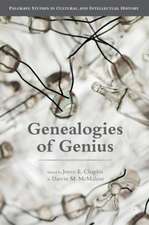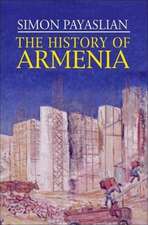The Antifascist Classroom: Denazification in Soviet-occupied Germany, 1945–1949
Autor B. Blessingen Limba Engleză Hardback – 19 dec 2006
| Toate formatele și edițiile | Preț | Express |
|---|---|---|
| Paperback (2) | 627.51 lei 6-8 săpt. | |
| Palgrave Macmillan US – 19 dec 2006 | 627.51 lei 6-8 săpt. | |
| Palgrave Macmillan US – 9 feb 2011 | 628.95 lei 6-8 săpt. | |
| Hardback (1) | 630.91 lei 6-8 săpt. | |
| Palgrave Macmillan US – 19 dec 2006 | 630.91 lei 6-8 săpt. |
Preț: 630.91 lei
Preț vechi: 742.25 lei
-15% Nou
Puncte Express: 946
Preț estimativ în valută:
120.80€ • 125.79$ • 100.23£
120.80€ • 125.79$ • 100.23£
Carte tipărită la comandă
Livrare economică 14-28 februarie
Preluare comenzi: 021 569.72.76
Specificații
ISBN-13: 9781403976123
ISBN-10: 1403976120
Pagini: 288
Ilustrații: XVI, 288 p. 12 illus.
Dimensiuni: 140 x 216 x 22 mm
Greutate: 0.45 kg
Ediția:2006
Editura: Palgrave Macmillan US
Colecția Palgrave Macmillan
Locul publicării:New York, United States
ISBN-10: 1403976120
Pagini: 288
Ilustrații: XVI, 288 p. 12 illus.
Dimensiuni: 140 x 216 x 22 mm
Greutate: 0.45 kg
Ediția:2006
Editura: Palgrave Macmillan US
Colecția Palgrave Macmillan
Locul publicării:New York, United States
Cuprins
Introduction Antifascism, Unity, and Division Setting up the School Rebuilding the School Rubble Children and the Construction of Gender Roles The Antifascist Narrative Antifascist Heroes: The Return of the Father Reestablishing Traditions Conclusion
Recenzii
'Blessing has written a thoroughly researched, well-argued, and absorbing book on a subject of enormous significance to our understanding of the origins and early development of communist East Germany. For anyone interested in how the 'antifascist classroom' shaped this process, it is essential reading.' - The American Historical Review
'his book, dealing with the attempts of East German pedagogues to create in the Soviet-occupied zone of Germany an antifascist democratic 'unity school' . . . does far more than report on these efforts. It touches on one of mankind's most troubling conundrums: how people of good will are persuaded or persuade themselves to persist in their idealistic endeavors even when they have come to know that their work has become part of a pernicious state apparatus or is put to use for evil purposes...Blessing should be complimented on a research assignment well executed and reported.' - Jurgen Herbst, History of Education Quarterly
'This book throws new light on the period between the end of the war and the founding of the GDR by focusing on the role of the school system in the Soviet zone and the attempt by the Sozialistische Einheitspartei Deutschlands (SED) to create a new antifascist identity in the eastern part of Germany...a very useful contribution to this debate for all researchers and students interested in the nature of eastern Germany's development after 1945.' - H-German
'This sensitive study explores the efforts of antifascist, democratic educators to create a comprehensive, unified school system in the Soviet occupation zone of Germany after 1945. By examining a plethora of teachers' and pupils' materials, the book recaptures the elusive hopes for a new beginning between the collapse of the Nazi dictatorship and Communist domination.' - Konrad H. Jarausch, Director, the Zentrum für Zeithistorische Forschung, Potsdam, and Lurcy Professor, the University of North Carolina, USA
'Blessing fills in an important gap in our understanding of the Soviet Zone of Occupation with her fine history of the beginning of the East German school system. Particularly interesting is her empathetic and lively analysis of thousands of essays and compositions of school children from the period itself, which she has found in the archives.' - Norman M. Naimark, author of The Russians in Germany: A History of the Soviet Zone of Occupation, 1945-1949
'A compelling study of the everyday life of antifascism in the first years after World War II. Benita Blessing explores the grass-roots efforts to establish a comprehensive, secular 'new school' in order to reclaim Germany's children from the Nazis and to build socialism. She incisively connects antifascism to Germany's humanist tradition but exposes as well how it blurred the Nazi past and encouraged narratives of victimhood. A timely and provocative study into the prehistory of the German Democratic Republic.' - Peter Fritzsche,University of Illinois, USA, author of Stranded in the Present: Modern Time and the Melancholy of History
'his book, dealing with the attempts of East German pedagogues to create in the Soviet-occupied zone of Germany an antifascist democratic 'unity school' . . . does far more than report on these efforts. It touches on one of mankind's most troubling conundrums: how people of good will are persuaded or persuade themselves to persist in their idealistic endeavors even when they have come to know that their work has become part of a pernicious state apparatus or is put to use for evil purposes...Blessing should be complimented on a research assignment well executed and reported.' - Jurgen Herbst, History of Education Quarterly
'This book throws new light on the period between the end of the war and the founding of the GDR by focusing on the role of the school system in the Soviet zone and the attempt by the Sozialistische Einheitspartei Deutschlands (SED) to create a new antifascist identity in the eastern part of Germany...a very useful contribution to this debate for all researchers and students interested in the nature of eastern Germany's development after 1945.' - H-German
'This sensitive study explores the efforts of antifascist, democratic educators to create a comprehensive, unified school system in the Soviet occupation zone of Germany after 1945. By examining a plethora of teachers' and pupils' materials, the book recaptures the elusive hopes for a new beginning between the collapse of the Nazi dictatorship and Communist domination.' - Konrad H. Jarausch, Director, the Zentrum für Zeithistorische Forschung, Potsdam, and Lurcy Professor, the University of North Carolina, USA
'Blessing fills in an important gap in our understanding of the Soviet Zone of Occupation with her fine history of the beginning of the East German school system. Particularly interesting is her empathetic and lively analysis of thousands of essays and compositions of school children from the period itself, which she has found in the archives.' - Norman M. Naimark, author of The Russians in Germany: A History of the Soviet Zone of Occupation, 1945-1949
'A compelling study of the everyday life of antifascism in the first years after World War II. Benita Blessing explores the grass-roots efforts to establish a comprehensive, secular 'new school' in order to reclaim Germany's children from the Nazis and to build socialism. She incisively connects antifascism to Germany's humanist tradition but exposes as well how it blurred the Nazi past and encouraged narratives of victimhood. A timely and provocative study into the prehistory of the German Democratic Republic.' - Peter Fritzsche,University of Illinois, USA, author of Stranded in the Present: Modern Time and the Melancholy of History
Notă biografică
BENITA BLESSING is Assistant Professor in the Department of History at Ohio University, USA.












